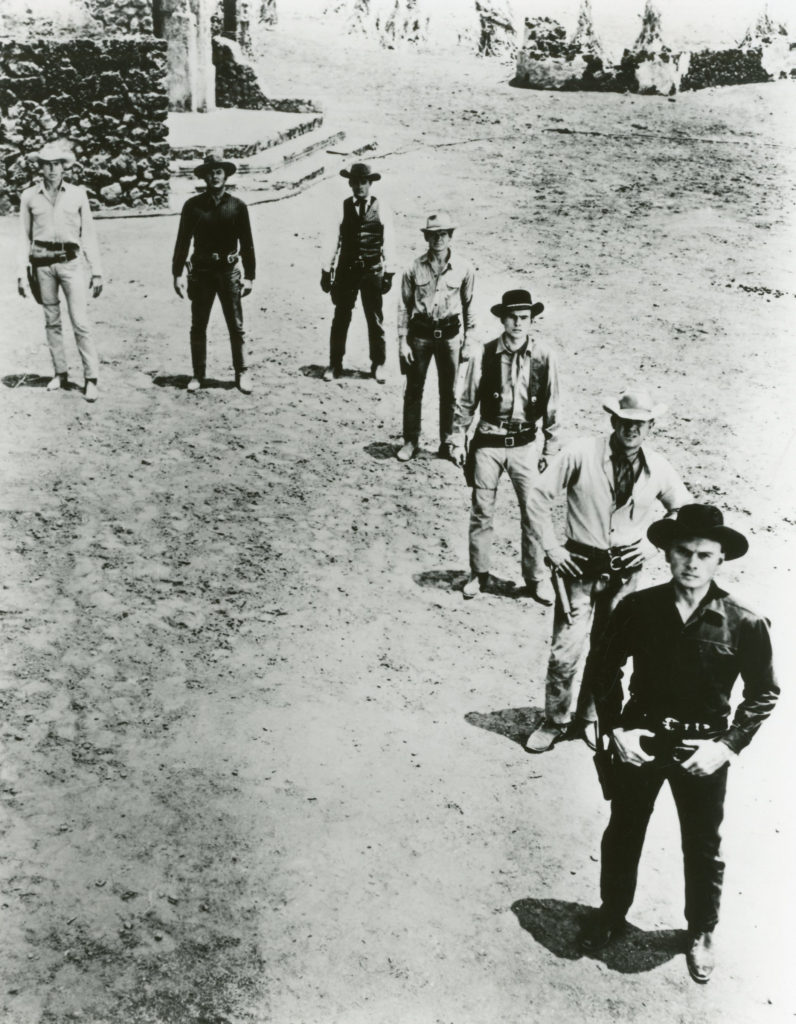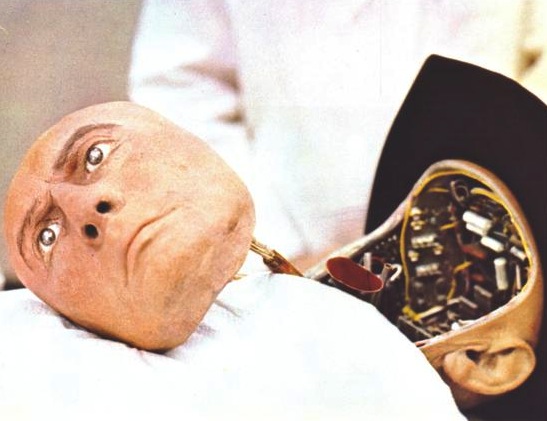So it turns out that even though Seven is the keynote number to each film, the key number to this series is one, one being Chris Adams. He is the only character to appear in more than two films, and it is his character arc which ultimately gives this unique series its meaning. Each film stands alone, of course, with none of them really dependent on any other (although Return makes a lot more sense after seeing the original), but it is the final film which really wraps things up for the character, as it should be.

It pretty much had to be that way. Most of the cast is, by necessity, killed off in each adventure. Heroic sacrifice, to be sure, but gone nevertheless. With only three survivors per entry, there was a definite limit to the connections which could be made for further movies, especially after Steve McQueen declined to participate (or was not asked to) in the second film. After that, it could really only proceed as a one-man story for a series. The dichotomy is that each story is an ensemble piece (after all, it is the Magnificent “Seven”) and yet the series focus is squarely on the shoulders of Chris Adams. The wonder of it is that it ended up working at all as a series — yet it does, mostly due to the final film’s alteration of his personal story.
For the record, it is (in my opinion) a pretty good collection of films, all told. The first one is great; the second, fair; the third and fourth pretty good, and they would have been better with just a few little changes (or reversions to original casting). Many series drop precipitously in quality; this one experiences such a drop but then recovers rather well and concludes with adventures that do not shame themselves. Had they been imagined with a bit more clarity from the beginning, and with a lack of infighting among the talented cast, this could have developed into a very memorable series. As it is, they are four disparate yet repetitive films linked by one character and can be enjoyed either way: separately or in series. And that’s okay.
Four films over thirteen years were not the last word regarding the Seven. Certainly the Mirisch Company could have continued with yet another group of gunfighters willing to fight, and possibly die, but what would be the point? It’s basically the same movie every time around, now matter how well made each one is. It was never designed to be a series, but put together piecemeal with only the Chris character (in three very different guises) to link them together. But again, this was not the last word.
First, Yul Brynner reappeared as Chris — sort of — right after the fourth film, in another western, albeit one as demonstrably different as apples from bananas. The film is Westworld (1973), and its sequel, Futureworld (1976), in which Yul reappears, yet again, as “the Gunslinger.” Now it is true that the character is not inherently Chris Adams. But Yul is dressed in the exact same clothes as Chris wears in The Magnificent Seven and has the persona of a slick gunfighter. Casting Yul Brynner as the gunslinger in Westworld is a knowing, sly, fabulous, brilliant wink at audiences by writer-director Michael Crichton, in his first feature film in those capacities. It was an “unofficial” nod to the actor and the role (different studios) but viewers and critics immediately recognized what was going on and how well it served the story. Futureworld followed three years later and even staged a love scene between the gunslinger and the heroine (Blythe Danner).

In 1998 The Magnificent Seven reappeared yet again, this time on television. The syndicated TV series lasted two seasons, over a total of twenty-two episodes. The cast included Michael Biehn as Chris Larabee, Eric Close as Vin Tanner, Dale Midkiff as Buck Wilmington, Ron Perlman as Josiah Sanchez, Anthony Starke as Ezra Standish, Rick Worthy as Nathan Jackson and Andrew Kavovit as John “J. D.” Dunne. Also of interest is that Robert Vaughn (Lee in the original film) appears as Judge Oren Travis in six episodes. I cannot give any opinion about the series; I’ve never seen a minute of it. The one really interesting difference to me, however, is that all seven of the Seven survive, in every episode, to act again in the next one. Compared to the movies, this is a huge change, and I have no idea how it played, but it sounds intriguing.
Finally, in 2016, director Antoine Fuqua brought together a new, much more diverse Seven for his vision of The Magnificent Seven. This time, Denzel Washington starred as Chisolm, Chris Pratt as Josh Faraday, Ethan Hawke as Goodnight Robicheaux, Vincent D’Onofrio as Jack Horne, Byung-hun Lee as Billy Rocks, Manuel Garcia-Rulfo as Vasquez, and Martin Sensmeier as Red Harvest. The assignment is similar: to protect a small town from an evil industrialist (Peter Sarsgaard). This time a young widow (Haley Bennett) is directly involved in recruiting the Seven and dispatching the villain at the end. And once again, only three survive.
No doubt another version will surface for a new generation at some point, and that women will be more directly involved in the tale. With its roster of anti-heroic characters, its moral dilemmas, its demand for sacrifice and its opportunities for action, this premise will never disappear. If William Shakespeare were around to write westerns, this is the type of material I believe he would write (although it might be more family-centric). It has everything, or the possibility of everything. And if it’s set to a score half as memorable as that of Elmer Bernstein’s, it could be glorious, just like the first movie turned out to be. 23 November 2020.
